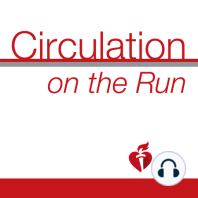16 min listen
Circulation July 2, 2019 Issue
ratings:
Length:
29 minutes
Released:
Jul 1, 2019
Format:
Podcast episode
Description
Dr Greg Hundley Welcome back everyone from our week hiatus for this July 2nd issue of Circulation On the Run. I'm Dr Greg Hundley, from the Pauley Heart Center at VCU health in Richmond, Virginia. Dr Carolyn Lam: And I'm Carolyn Lam, associate editor from the National Heart Center and Duke National University of Singapore. So good to be back, Greg. Dr Greg Hundley Absolutely. So Carolyn, our featured articles going to focus on amyloid and transthyretin amyloid is recognized in middle age and older individuals with increases in LV mass and heart failure. And in our featured article from the United Kingdom, Dr Gilmore and colleagues are going to discuss the natural history of this disease and compare outcomes of those with acquired versus hereditary forms of the disease. But before we get to that interview, how about we discuss several other original articles? Dr Carolyn Lam: For sure, Greg. Thanks. I want to pick two genetic papers in this issue. They're really exciting. The first one is actually the first study to consider the association between rare genetic variance in a large set of cardiomyopathy genes and the occurrence of cancer therapy induced cardiomyopathy. So this paper is from co-corresponding authors, Dr Garcia-Pavia from hospital Universitario Puerta de Hierro from Madrid, and Dr Christine Seidman from Harvard Medical School in Boston, Massachusetts. The authors studied 213 patients with cancer therapy induced cardiomyopathy from three cohorts. The first retrospectively recruited adults with diverse cancers, the second prospectively phenotyped breast cancer patients. And then the third prospectively phenotyped children with acute myeloid leukemia. They showed an increased prevalence of rare variants in cardiomyopathy genes, particularly the truncating variants of the TTN gene in both adults and pediatric cancer patients with cancer therapy induced cardiomyopathy. They confirmed the human genetic data with experimental analyses showing that anthracyclines induced protracted left ventricular dysfunction in mice with truncating variants of TTN genes but not in the wild type mice. Dr Greg Hundley Aha. So what are the clinical implications of this study, Carolyn? Dr Carolyn Lam: Well, the findings show that variance in cardiomyopathy genes contribute to cancer therapy induced cardiomyopathy susceptibility among adult and pediatric cancer patients. And thus the identification of genetic risk factors really opens the door to new opportunities to define patients at high risk of cancer therapy induced cardiomyopathy and associated adverse outcomes. I want to go onto the next paper because it's so related. It's another genetic paper. This time looking further at the truncating variants of the TTN genes and a very novel approach, they aim to assess a genomics first approach to assess the consequences of these TTN variants. So, this was from corresponding author Dr Zoltan Arany from Perelman School of Medicine in University of Pennsylvania where he and his colleagues reviewed whole exome sequence data for more than 71,000 individuals to identify anyone with truncating variants of TTN genes. They further selected individuals with these variants in exons highly expressed in the heart and using a linked electronic health record, they evaluated the associations of these truncating variants of TTN genes with the diagnosis and quantitative echocardiographic measures. They also reviewed data from the Jackson Heart study to validate specific analyses for individuals of African ancestry. Dr Greg Hundley Interesting. So we're hearing a little bit about different ancestry and TTN genes. What did they find? Dr Carolyn Lam: So, I should have first clarified that that first look was in individuals of European ancestry. And they found there that the individuals of European ances
Released:
Jul 1, 2019
Format:
Podcast episode
Titles in the series (100)
Circulation August 30, 2016 Issue: Circulation Weekly: Your Weekly Summary & Backstage Pass To The Journal by Circulation on the Run
